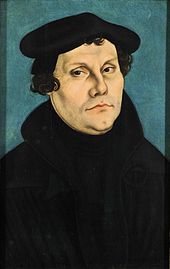What is the significance of Reformation Sunday?

Painting of Martin Luther by Lucas Cranach the Elder
“Here I stand”
It started on All Saints’ Eve, 1517, when Luther publicly objected to the way preacher Johann Tetzel was selling indulgences. These were documents prepared by the church and bought by individuals either for themselves or on behalf of the dead that would release them from punishment due to their sins. As Tetzel preached, “Once the coin into the coffer clings, a soul from purgatory heavenward springs!”
Luther questioned the church’s trafficking in indulgences and called for a public debate of 95 theses he had written. Instead, his 95 Theses spread across Germany as a call to reform, and the issue quickly became not indulgences but the authority of the church: Did the pope have the right to issue indulgences?
Events quickly accelerated. At a public debate in Leipzig in 1519, when Luther declared that “a simple layman armed with the Scriptures” was superior to both pope and councils without them, he was threatened with excommunication.
Luther replied to the threat with his three most important treatises: The Address to the Christian Nobility, The Babylonian Captivity of the Church, and On the Freedom of a Christian. In the first, he argued that all Christians were priests, and he urged rulers to take up the cause of church reform. In the second, he reduced the seven sacraments to two (baptism and the Lord’s Supper). In the third, he told Christians they were free from the law (especially church laws) but bound in love to their neighbours.
In 1521 he was called to an assembly at Worms, Germany, to appear before Charles V, Holy Roman Emperor. Luther arrived prepared for another debate; he quickly discovered it was a trial at which he was asked to recant his views.
Luther replied, “Unless I can be instructed and convinced with evidence from the Holy Scriptures or with open, clear, and distinct grounds of reasoning … then I cannot and will not recant, because it is neither safe nor wise to act against conscience.” Then he added, “Here I stand. I can do no other. God help me! Amen.”
By the time an imperial edict calling Luther “a convicted heretic”was issued, he had escaped to Wartburg Castle, where he hid for ten months.
In early spring of 1522, he was able to return to Wittenberg to lead, with the help of men like Philip Melanchthon, the fledgling reform movement.
Over the next years, Luther entered into more disputes, many of which divided friends and enemies. He married a runaway nun, Katharina von Bora, which scandalized many. (For Luther, the shock was waking up in the morning with “pigtails on the pillow next to me.”)
His lasting accomplishments also mounted: the translation of the Bible into German (which remains a literary and biblical hallmark); the writing of the hymn “A Mighty Fortress is Our God” (and many others); and publishing his Larger and Smaller Catechism, which have guided not just Lutherans but many others since.
His later years were spent often in both illness and furious activity (in 1531, though he was sick for six months and suffered from exhaustion, he preached 180 sermons, wrote 15 tracts, worked on his Old Testament translation, and took a number of trips). But in 1546, he finally wore out.
Luther’s legacy is immense and cannot be adequately summarized. Every Protestant Reformer—like Calvin, Zwingli, Knox, and Cranmer—and every Protestant stream—Lutheran, Reformed, Anglican, and Anabaptist—were inspired by Luther in one way or another. On a larger canvas, his reform unleashed forces that ended the Middle Ages and ushered in the modern era.
(primarily from Christianity Today)
On Sunday, October 29, we will celebrate 500 years of the Lutheran Reformation in a joint worship service with Peace, Trial and St. Peter, Castlegar. The service will be in Trail and begin at 10:00 am. Following the service we will gather together for a Reformation feast! This is a ‘once in 500 years’ opportunity, so bring your best to share!
Pastor Ron Abresch
West Kootenay Lutheran Churches – LCC
